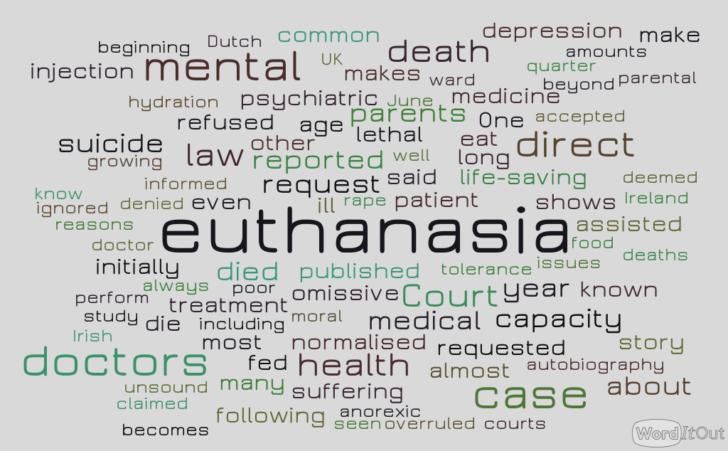When 17 year old Noa Pothoven died recently in the Netherlands following a long period of mental illness, it was initially and erroneously reported that she died by lethal injection under her country’s euthanasia law. In fact, she was allowed to refuse food and hydration. This is almost as disturbing and still shows a growing tolerance for what amounts to suicide.
Pothoven was suffering from depression, anorexia and other mental disorders following three sexual assaults, as she said in an autobiography published in 2018.
The teenager, a legal minor, had requested direct euthanasia, as initially reported, but this was denied because her parents had not been informed. She then refused to eat and drink, and doctors did not intervene. If so, it was a case of omissive euthanasia, which is when doctors do not perform a necessary life-saving treatment, as opposed to direct euthanasia regulated by the law, which is when they actively provoke the death of the patient, for example by lethal injection.
It makes no difference from a moral point of view as the duty of a doctor is always to save lives when possible.
In other jurisdictions it is common for courts to order that minors be fed when refusing to eat.
In Ireland, for instance, the High Court sometimes makes people wards of court and ensures they are fed if they would otherwise die of starvation.
At the beginning of June, the Irish Times reported on a case involving a woman self-harming and starving herself, and the Court overruled a medical report that claimed she was not of unsound mind. The judge said if he didn’t make her a ward of court, it would be tantamount to signing her death warrant. (Here and here you can find some recent similar cases)
In the UK, guidance from 1997 “allows doctors to force-feed anorexic patients if they are deemed to lack mental capacity. Doctors may also over-rule patients’ refusal of medical treatment on capacity grounds.”
What happened in the Noa Pothoven case, instead, is a sign of what inevitably follows when euthanasia becomes normalised, i.e. even the most basic life-saving treatments are neglected by doctors if patients request so. Life can be seen as a sort of ‘disease’ and death as ‘medicine’. But how can someone in very poor mental health possess the capacity to make decisions about her health and welfare?
Every year, more than 6,000 deaths are due to euthanasia or assisted suicide in the Netherlands. One wonders why this case became so prominent, and many similar ones are ignored.
Was it because of the age of the patient? Or because her story was known? Was it because she was a rape survivor? Or also because of her mental health conditions?
With regard to age, according to the law in the Netherlands children as young as 12 may be euthanised with the permission of their parents. Patients aged 16 to 18 may have their death induced against parental wishes as long as the parents have been made aware, which was not the case with Noa Pothoven.
The killing of mentally ill patients is also common. In 2018, 146 Dutch patients with dementia and 67 suffering psychiatric disorders were put down through direct euthanasia or assisted suicide. We don’t know how many died because of omissive euthanasia.
The clinic that rejected Noa Pothoven’s application has refused to comment on her specific case but it is well known for offering direct euthanasia. In the last seven years it has received almost 13,000 requests and accepted about 3,500. Last year, about a quarter of them were from patients solely with mental health issues.
A study published in 2015 in the British Medical Journal shows that of 100 patients who requested direct euthanasia for psychiatric reasons not even one was terminally ill. They suffered of mood disorders, post-traumatic stress disorders, eating disorders, autism, etc. The most frequent diagnosis was depression.
From the sad story of Noa Pothoven we can learn that once euthanasia is normalised, it has effects beyond the law. The role of doctors is not to cure but to satisfy the request of patients, including their request to die. But this is not medicine anymore.
See also:
A duty to die? Assisted suicide in Belgium and the Netherlands.
UCD conference gives us a foretaste of the coming push for a ‘right to die’
Assisted suicide comes before the Oireachtas Justice Committe.
World Medical Association should defend its policy against euthanasia and assisted suicide.
















